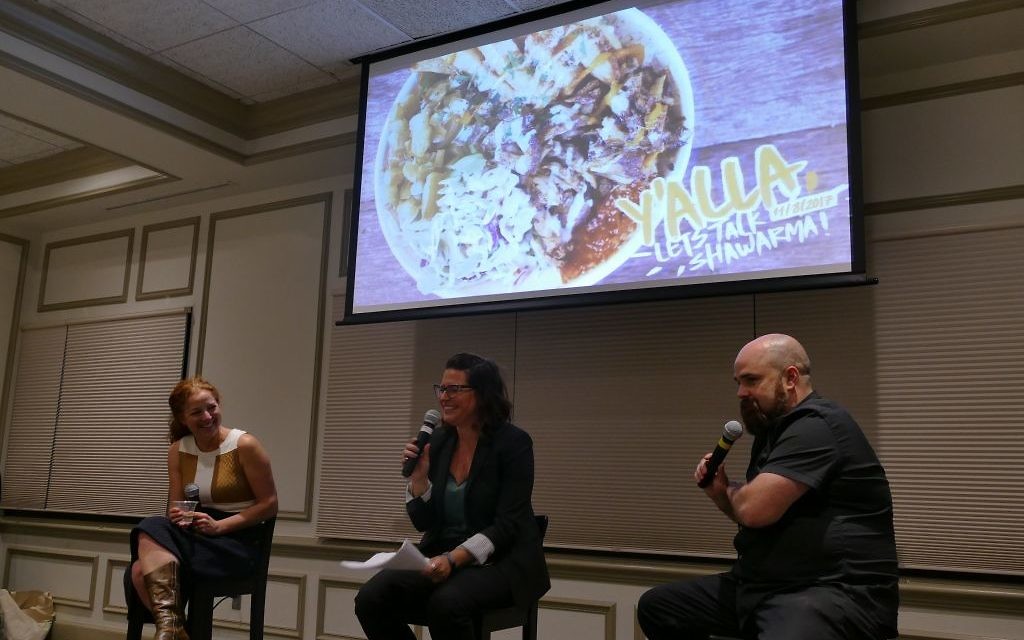Mediterranean Flavors Influence Atlanta Cuisine
“Y’alla Let’s Talk Shawarma,” a Nov. 8 discussion about how Mediterranean cuisine influences American food featured Yalla co-owners Jennifer Johnson and chef Todd Ginsberg.

When Israeli native Hagar Sides visited Kroger’s hummus section for the first time, she was fascinated and overwhelmed by the variety of flavors, such as red bean and edamame, and wondered what had happened to hummus. How had it evolved from Israel to the United States?
The experience led Sides to organize and moderate “Y’alla Let’s Talk Shawarma,” a discussion about how Mediterranean cuisine influences American food with Yalla co-owners Jennifer Johnson and chef Todd Ginsberg.
The idea developed after Sides noticed that people were more attached to their cellphones than face-to-face conversation, she said.
Get The AJT Newsletter by email and never miss our top stories Free Sign Up
“I wanted to create a space similar to people’s living rooms where they could exchange information and learn something new without hashtags and just talk,” Sides told the audience Wednesday, Nov. 8, at the Jewish Federation of Greater Atlanta.
After working as a lawyer at King & Spalding, Johnson left her law career to open a small cafe in Atlanta. She now co-owns West Egg Cafe, Fred’s Meat & Bread, Yalla and The Canteen with Ginsberg. They have spent 10 years bringing Mediterranean cuisine from the suburbs to the city.
“I used to go to Pita Palace, and it was one of my inspirations for Yalla and first introduction to shawarma,” Ginsberg said.
He has continued to incorporate Mediterranean influences into his menus while drawing ideas from Yotam Ottolenghi and Sami Tamimi’s cookbook “Jerusalem.”
“I think Ottolenghi and his partner, Tamimi, were ahead of the curve and started a trend that was bound to happen. … I think they are single-handedly responsible for everything that is happening in Middle Eastern food right now,” Ginsberg said. “It’s colorful and refreshing, and a lot of his food is not necessarily traditional, but that’s what people want.”
After opening Fred’s Meat & Bread at Krog Street Market, Johnson and Ginsberg decided to open Yalla.
“We wanted something fresh, and one of the things we thought we didn’t have enough of was Middle Eastern food,” Johnson said.
Ginsberg traveled to Israel to try the cuisine and drew inspiration from Michael Solomonov’s documentary “In Search of Israeli Cuisine.”
“I never really thought about going to Israel — I don’t know why — but when the opportunity came, I went,” Ginsberg said. “Once you go there, there are a million reasons to go back.”
Yalla presented nonculinary challenges.
“It was the first time we had to think about anything political about food,” Johnson said. “We were careful and always referred to Yalla as modern Middle Eastern, but at the same time we are running a business and didn’t want to alienate people as if we were making a statement.”
She said Yalla received anti-Israel tweets and messages. “We had to decide whether to defend it or go back and say that we never used the word Israeli and sound cowardly, but at the end of the day, I thought, ‘I’m just trying to feed people.’”
Ginsberg said: “Feeding people is part of hospitality. It is a generous and intimate thing, and whenever I cook for people, I want them to be satisfied and feel like they will remember the experience of me cooking for them.”
Sides said there is no definition for Israeli food because the cuisine draws from other countries in the Middle East.
“If you think about it, up until five years ago it was very hard to define American cuisine,” Ginsberg said. “We are 200 years old as a country. Israel is a quarter of that, so defining Israeli cuisine is hard, but it’s also a beautiful melting pot of culture.”
Millennials are interested in trying new types of food, and Johnson said they enjoy the mix of Ashkenazi and Middle Eastern cuisine. “I think that’s how Middle Eastern food has become mainstream. Millennials are more thoughtful about what they are eating, where it comes from and consuming less meat than our parents did, which as a result of that has created a palate of different cuisines to choose from.”
Millennials help the restaurant by spreading the food through social media, Ginsberg said. “Our parents didn’t have that, and back in the day, one person could tell 10 people, while today one person can tell a thousand people.”
Sides said, “At the end of the day food connects people.”





comments